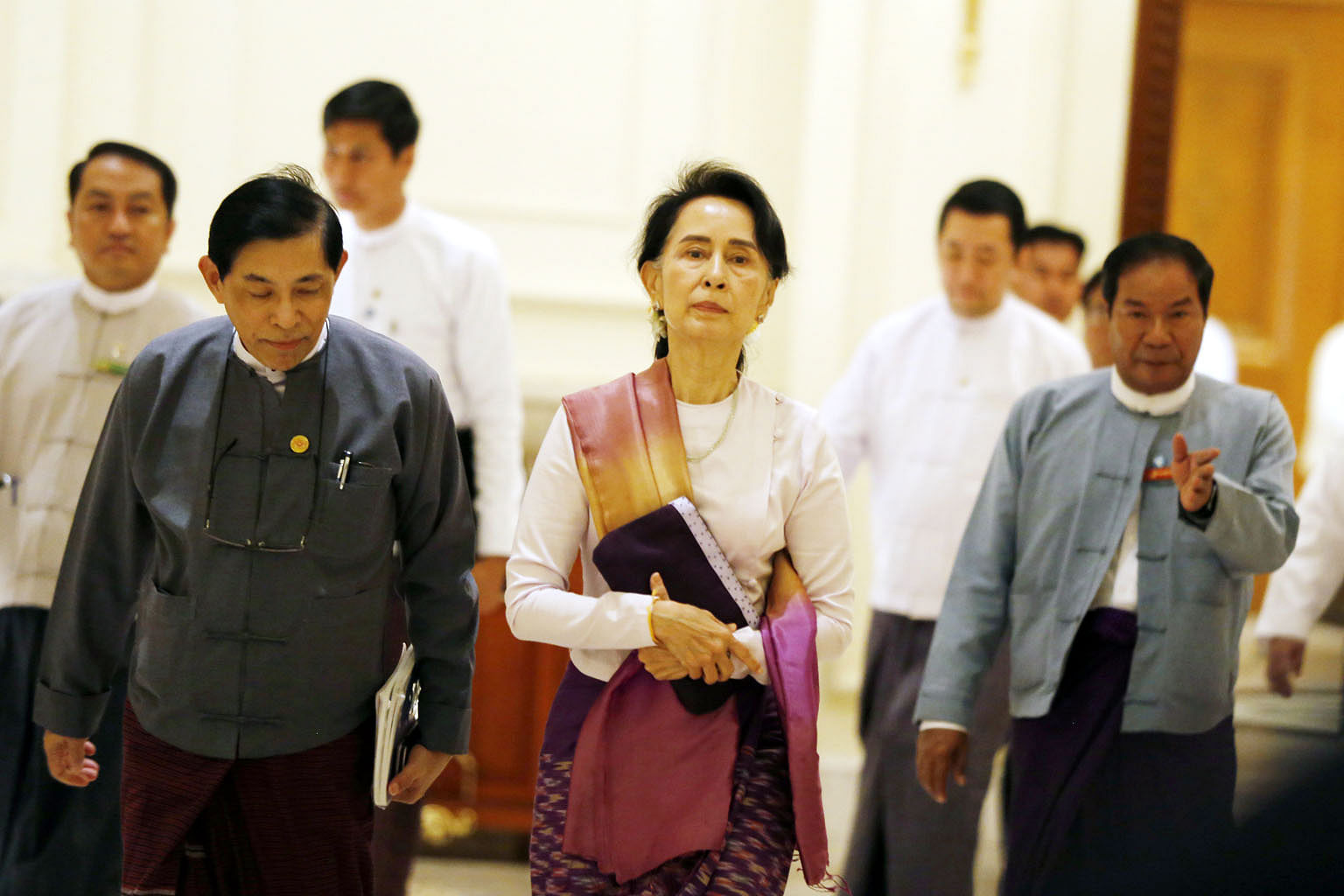WASHINGTON • Commentators and members of the democracy and human rights community have turned on Ms Aung San Suu Kyi, State Counsellor and de facto head of Myanmar's civilian government, since violence exploded in Rakhine state on Aug 25 with savage reprisals from the army after attacks on security personnel by militants from the Arakan Rohingya Salvation Army (Arsa).
As of Thursday, an estimated 380,000 Rohingya Muslims had fled across the border into Bangladesh, triggering a major humanitarian crisis and region-wide alarm over the conflict's wider security implications.
This has been accompanied by a savage excoriation of Ms Suu Kyi, who once could do no wrong in the eyes of some when she was Myanmar's lonely icon of democracy, isolated in her peeling lakeside bungalow as a prisoner of an opaque military regime.
"The Lady" - as she has been known for decades - had always maintained that she was not an icon but a politician. Now the apparently fallen icon is being savaged by the very quarters that elevated her. Western media commentators and advocacy groups have led a feeding frenzy tinged with a sense of self-righteous injury.
But the criticism is at best naive, and at worst counterproductive. The iron-willed Ms Suu Kyi is no stranger to walking a razor's edge. The angry rhetoric will have no effect; rhetoric rarely does.
Under Myanmar's Constitution, the army, not Ms Suu Kyi, runs three key security-related ministries, has an allocation of 25 per cent of the seats in Parliament, and appoints one of two vice- presidents.

The Constitution was written by the erstwhile junta specifically to ensure it would retain all security powers. Ms Suu Kyi essentially has little or no role in security issues.
Any visit to army headquarters, a short drive from Naypyitaw, leaves no doubt as to who really runs the country. The presidential palace in Naypyitaw may be opulent, but the Tatmadaw's headquarters are positively imperial.
With the majority of Bamar- Buddhist public opinion stridently against the Rohingya, the few moderates - like the senior former government figure who told me in 2015: "One day we should have a Myanmar where everyone is simply Myanmar, not Karen, Kachin, Shan, Chin, Mon, Arakanese" - who have been working quietly and welcomed the recommendations of the Kofi Annan Commission, have been marginalised.
Ms Suu Kyi herself is, in effect, unable to take a public stand for the Rohingya or against the army, else she will lose her political base and lose the cooperation of the army - which has happened before with well-known consequences.
Most foreign observers have only witnessed the end product of this chronic and horrific crisis - desperate Rohingya. In addition there is distrust - not without reason - of the Myanmar army's counter narrative. There is no appetite for nuance and detail; in fact, in the prevalent toxic atmosphere, there is no tolerance on any side for inconvenient detail.
Targeting Ms Suu Kyi will make any attempt by her to quietly engineer solutions more difficult, and for good reason. International criticism will only ignite resentment from the Bamar-Buddhist majority, leaving her no option but to side with her base. It also plays into the army's hands; anything that puts Ms Suu Kyi in an awkward position, eroding her credibility whether with her own public or the international community, may well suit the army.
The military's popularity is high now; it is flexing its muscle as the international community - with some exceptions - is busy discrediting Ms Suu Kyi and the National League for Democracy.
Ironically, there is no alternative on offer. How easily a supposedly democratic nation can revert to military rule when the army believes national security is at stake has been amply demonstrated in neighbouring Thailand.
Being stuck on Ms Suu Kyi also blocks constructive fact-based debate that could actually make some progress on the volatile and exceedingly complex issue of Rakhine state.
On the ground, Rakhine state is not a conveniently bifurcated world of victims and perpetrators. The Arsa itself has killed Rohingya it suspects of having worked with the government. There are many Rohingya who disagree with the tactics of the Arsa, which has also incited Rohingya villagers to attack Rakhines.
Rakhines have attacked Rohingya, with or without the cooperation or licence of the police and the army. Security forces have attacked Rohingya indiscriminately, with the army's top brass seemingly seeking their own final solution. The losers in all this are innocent civilian Rohingya, so many of them children, orphans of empire and accidental foreigners in their own country.
"This humanitarian disaster is not of Suu Kyi's making. It has been created by men with guns," maintains Ms Priscilla Clapp, a former US charge d'affaires in Myanmar.
"The international community has to back off from the hostile rhetoric and talk about crafting a humane and workable solution, including the return of the Rohingya who fled into Bangladesh."


